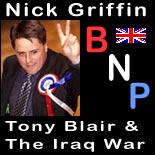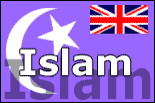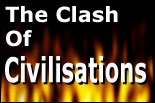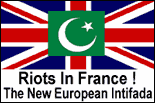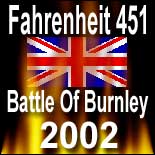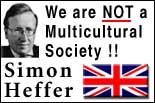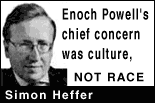|
|
|||||||||||||||||||||||||||||||||||||||||||||||||
|
“The report also says armed
militiamen affiliated with radical Shiite Muslim cleric Muqtada
al-Sadr pose the gravest danger to the security and stability
of Iraq, surpassing Sunni Arab insurgents and even al Qaeda terrorists.
The finding is the military's strongest declaration of the danger
posed by al-Sadr.”
According to the article in the Financial Times of December 16: Doubts precede Baghdad reconciliation conference “Sunni for their part complain that six months of national reconciliation pledges do not seem to have reduced the activities of Shia death squads, most of whom are believed to be affiliated to militias loyal to the radical Shia cleric Moqtada al-Sadr - a key ally of the prime minister, Nouri al-Maliki.” This then directly links with Ahmadinejad’s beliefs and preaching about the return of 12th Imam. In his book, Islamic Way of Life, Mawdudi wrote: “The chief characteristic of the Islamic Concept of Life is that it does not admit a conflict, nay, not even a significant separation between life-spiritual and life-mundane. It does not confine itself merely in purifying the spiritual and the moral life of man in the limited sense of the word. Its domain extends to the entire gamut of life. It wants to mould individual life as well as the social order in healthy patterns, so that the Islamic kingdom of God may really be established on earth and so that peace, contentment and well-being may fill the world as waters fill the oceans. The Islamic “way of life” is based on this unique approach to life and a peculiar concept of man’s place in the universe. That is why it is necessary that before we proceed to discuss the moral, social, political and economic systems of Islam, we should have a clear idea of the Islamic Concept of Life.” One of the most important contributions of Mawdudi in twentieth century Islam has been his presentation of Islam as a system of life, a complete code of conduct that governs all aspects of human existence. The basic proposition in Mawdudi’s theory is God’s exclusive sovereignty. According to him: “God’s sovereignty covers all aspects of political and legal sovereignty, also, and in these two no one other than God has any share. No monarch, no royal family, no elite class, no leader of any religious group, no democracy vested in the sovereignty of the people can participate in God’s sovereignty. Whosoever claims such a position is a rebel. Similarly, any institution or individual attempting to assume political and legal sovereignty and seeking thereby to restrict the jurisdiction of God to spheres of personal law or religious duties is a usurper and a rebel. The truth is that no one can claim to be a lawgiver, save under the dispensation of God. No one can challenge the supreme authority of God Almighty in any sphere.” Mawdudi’s concepts of an Islamic state reject any Western model. In his view, everything about Western civilization was wrong and harmful because it was not God-given but elaborated by political leaders on the basis of false beliefs. To him and his followers, the West had long ago denied the sovereignty of God. Therefore, all things its people have constructed are unacceptable. The works of Mawdudi were translated into Arabic and other languages as early as 1940. They exerted a profound influence on the Muslim Brotherhood in Egypt and in other Muslim countries. They helped shape contemporary militant fundamentalist movements. The Islamic Fundamentalist Movement Does Not Represent Backward-Looking Traditionalists The religious and political ideas of Mawlana Mawdudi and Sayyid Qutb (Qutb wrote the famous book Milestones which was and still is a leading text for Islamic fundamentalism.) constitute the intellectual basis of many modern revivalist (fundamentalist) movements within the Islamic world. They were certainly more critical and disapproving than the Islamic modernists’ idea of bringing together specific Islamic and Western ideas and modernizing Islamic civilization along the lines those Western societies had previously experienced. Nevertheless, it would be wrong to claim that Mawdudi, Qutb, and those people who followed in their footsteps were backward-looking, reactionary traditionalists. This is not only because they admired specific aspects of Western civilization, such as Western science and technology, but also because the kind of Islamic society that they aspired to create was a modern one. The way they defined the nature of an ideal relationship between an Islamic government and its citizens, the manner in which they formulated the rights, duties and privileges of individual Muslims in such an ideal society, and their reinterpretation of the basic principles of Islam to construct a modern ideology prove this observation. The New Socialism and Islamist Economists The people in the West who are trying to construct a new socialism, a de-Marxified alternative to the politics of pure individualism, share the views of Islamist economists. These Westerners also accept the market as the essential driving-force of any economy, but they too wish to set it within a man-made moral framework that will ensure support for the weak through the compassion and self-discipline of the strong. What communism tried and failed to achieve through the state, one Islamic economist has written, “is to be established through the agency of man himself.” It would be a good slogan for the possible new socialism of the twenty-first century. As we will see, these principles are being promoted broadly in the West. This merging of ideologies is a powerful force in today’s political environment. This merging is taking the form of a Marxist/Leftist - Islamist Alliance. The Role of Yusuf al-Qaradawi More recently, credit needs to be given to Professor Dr. Yusuf al-Qaradawi for his important book, The Lawful And The Prohibited In Islam. Islamic law on commerce is known as fiqh al-mu`amalat. Much of the laws, rules and interpretations of Shariah takes into consideration issues of social justice, equitability, and fairness, as well as practicality of financial transactions. In general, the Shariah legal maxim in relation to commercial transactions and contracts states: “They are permissible unless there is a clear prohibition.” In a nutshell, prohibited elements of a commercial transaction must first be removed for it to be Shariah-compliant. The major prohibited elements under Shariah are riba (interest), gharar (uncertainty), maisir (gambling), non-halal (prohibited) food and drinks and immoral activities. The principles laid out by al-Qaradawi are having profound influence on all daily and commercial activities, not only in the finance sector, but also in the energy, transportation (ports and terminals), construction, and food and drink sector. The goal is to bring all commercial activity into Shariah compliance. The Goal: Establishment of a Separate Muslim Society Mawdudi had as his goal the establishment of a separate Muslim society, not integration and/or assimilation into Western culture. The existence of such Muslim dominated ghettos as Clichy-sous-Bois and Bagneux outside Paris and Leicester in the U.K. are examples of lack of Muslim integration. These concepts also pervade the Islamic banking sector of the Major Money Center Banks, with the fact that the accounts from the Islamic windows may not be co-mingled with those of non-Muslims. For his part, Mawdudi appealed to the old notion of the universal Muslim community, the Ummah, which operates according to traditional principles of Islamic solidarity. Essentially undifferentiated except by gender, the Ummah is supposed to transcend tribal, national, regional, and local ties. Having its own laws, values, and convictions, it is to be the individual Muslim’s principal source of identity and the focus of his loyalty. The teaching of Mawdudi on no integration and/or assimilation into Western culture has far-reaching impact today on many of the issues being addressed in Europe. When immigrants came to America in its formative years, their goal was integration into a unified culture; this is what made America the strong nation it is. In Canada, the Muslim population has sought and has already achieved the separation by the creation of separate civil courts for Muslims. The goal of Islamists is the incremental Islamization of all countries and peoples. Ummah is an Arabic word that means “community” or “nation.” In the context of Islam, the word ummah is used in foreign languages as well as in Arabic to mean the “nation of the believers” (ummatu l-muminin), and thus the whole Muslim world. The phrase al-ummatun wahid in the Qur’an (the “One Community”) refers to the entire Muslim world unified. Some modern Islamists use the term Islamic Ummah or Muslim Ummah to refer to all the people in the lands and countries where predominantly Muslims reside, and which were once under the control of the Islamic caliphate. Whatever one thinks of his agenda, he was onto something real: with technological progress, economics was indeed becoming increasingly important to daily life everywhere. In a technologically primitive and static world, where family background determines one’s career, where one plants and sells crops in the ways of one’s grandparents, where one has little to spend on non-subsistence goods, and where markets offer little variety, economics may be vital to physical survival, but economic decision-making does not absorb much attention. By contrast, in a technologically advanced world, where job choices must be made, where women pursue and interrupt careers outside the home, where investment choices require monitoring, and where markets offer abundant choice, economic decision-making absorbs considerable time. It follows that if economic choice is considered a secular activity, economic advances will make Muslim existence look increasingly secular. But if economic activity is considered a religious activity, then economic development need not reduce Islam’s perceived role in the lives of Muslims. Traditional Muslim Values vs. Contemporary Muslim Values We profoundly misunderstand contemporary Islamist ideology when we see it as an assertion of traditional Muslim values or culture. In a traditional Muslim country, your religious identity is not a matter of choice; you receive it, along with your social status, customs and habits, and even your future marriage partner from your social environment. In such a society, there is no confusion as to who you are, since your identity is given to you and is sanctioned by all of the society's institutions, from the family to the mosque to the state. The Spread of Islamic Economics The declared purpose of Islamic economics is to establish a new world economic order that conforms to Islamic scripture--the Qur’an--and Muslim tradition. (1) Its core positions took shape in the 1940s, and three decades later, efforts to implement them were under way in dozens of countries. (2) In Pakistan, Malaysia, and elsewhere, governments are now running centralized Islamic redistribution systems known as zakat. More than sixty countries have Islamic banks that claim to offer an interest-free alternative to conventional banking. Invoking religious principles, several countries, among them Pakistan and Iran, have gone so far as to outlaw every form of interest; they are forcing all banks, including foreign subsidiaries, to adopt, at least formally, ostensibly Islamic methods of deposit taking and loan making. Attempts are also under way to disseminate religious norms of price setting, bargaining, and wage determination. And for every such initiative, others are on the drawing board. From these developments one might infer that Islamic economics arose to advance an economic agenda. In fact, the doctrine emerged in late-colonial India as an instrument of identity creation and protection; at least initially, the economics of Islamic economics was merely incidental to its Islamic character. Islamists Seek to Legitimize Religion by its Social Roles Islamic banking and Islamic economics present themselves as alternatives to the dominant systems, but they are no more sacred than neo-liberal economic policies. Islamists, who claim that Islam prescribes coherent systems of economic, political and social organization, implicitly seek the legitimatization of religion by its social roles. By contrast, in traditional Islamic society, their sacred dimension legitimated social arrangements. It is important to understand the role of contemporary Islam vs. traditional Islamic society. This shift in the Muslim society is a significant contributing factor to the Clash of Ideologies. The Movement - Experiments in Islamic Economics The Muslim Brotherhood Movement (Ikhwan) began in 1928 as a youth organization formed in Egypt by Sheikh Hasan al-Banna and five like-minded followers. It was formed immediately following the collapse of the Ottoman Empire and in consideration of the 1924 abolition of the caliphate by Turkish reformer Kemal Ataturk and after much contemplation of the sickness that had reduced the Ummah to its present state. Beginning in the late ‘50s and early ‘60s and to the present day, the Ikhwan contributed to establishing a firm basis for Islamic communities in Europe and North America. This was done mainly through fostering the establishment of local community organizations, Islamic schools, national associations, and special interest organizations, e.g., medical, scientific, cultural. From the earliest years, establishing an Islamic economic system was a priority for the Ikhwan. Hasan al-Banna, Sayyid Qutb, Yusuf al-Qaradawi and many other scholars laid down some of the groundwork for practical theories of Islamic finance. Later, specialized writers provided the practical basis for Islamic financial institutions, a number of which were developed in Muslim countries. The Wahhabi ideology of the Saudi state, for example, and the religious doctrines of the Muslim Brotherhood in Egypt and a host of voluntary religious organizations around the Islamic world are all Salafi . These diverse movements share the belief that Muslims have deviated from God’s plan and that matters can be returned to their proper state by emulating Muhammad. HAMAS: Islamic Resistance Movement in Palestine The acronym HAMAS, taken from the Arabic Harakat al- Muqawama al-Islamiya--Islamic Resistance Movement--literally denotes “zeal” or “enthusiasm.” The Hamas Covenant, however, interprets its name to mean “strength and bravery.” Hamas officially came into being in August of 1988. Founded as an alternative to the secular Palestine Liberation Organization, Hamas offers its activists the total rejection of Israel, together with absolute salvation. Hamas is an offshoot of the Muslim Brotherhood Movement. Like the Brotherhood, Hamas completely rejects Western values and communism and calls for the establishment of a pan-Islamic state—the Ummah founded on the basis of Shariah. It is in part the concept of forming a pan-Islamic state that conflicts with the creation of the Palestine state. While some seek to create the Palestine state initially, others seek to create the broader pan-Islamic Ummah. As long as this conflict exists, it will be difficult to reach agreement on the Israel-Palestine peace agreement. Iran seeks to incorporate Palestine into the Shiite Crescent, which of course would impact Saudi Arabian desires for a Sunni Caliphate. To attain the objective of an Ummah, it promoted the concept of an ideal Muslim state to be ruled by a caliph, the title bestowed upon the successors of the Prophet Muhammad at the beginning of the Islamic empire. It is important to recognize that there are conflicts for control of Hamas between the Shia—Iran support and the Sunni—Saudi/Egypt support factions. In October of 1992, the Iranian government agreed to a request by Hamas to open an “embassy” for the organization in Tehran. This Hamas “embassy” continues to maintain the contacts and coordination with the Lebanese Hizballah (Hezbollah) organization, also located in Tehran. Additionally, the Iranian government promised to provide training for three thousand Hamas terrorists. With Iran’s relations with both HAMAS and the Lebanese Hizballah organizations, one could conclude that Iran had reached the Mediterranean. See my article: "Iran Reaches the Mediterranean" Ayatollah Seyyed Ruhollah (Ruhallah) Khomeini was the first Muslim cleric in modern times to create an Islamic government based solely on his personal conception of what such a government should entail. Along with Mawdudi and Qutb, Khomeini became an architect of late twentieth century Islamic revolutionary thinking. Few doubt that previously unorganized, grassroots religious groups played a key role in Mr. Mahmoud Ahmadinejad’s successful election campaign for president of Iran in 2005. “He rode a wave, using mosque-based organizations and even maddahs [religious singers] to gain support,” says Mohammad-Ali Abtahi, cleric and former reformist vice-president. “But these songs aren’t political; they're not praising the Islamic Republic, only the Twelfth Imam.” For political leaders to seek backing from popular religion, mystics or even millennialists is hardly new in Iran. The Safavid Dynasty (1501-1722), which converted the country to Shi’ism, sprang from a small Sunni sect whose followers believed its leader was divine. The Shah of Iran; often seen as a secular modernizer, allowed mobs to attack Baha’is, a sect seen as heretics by conservative Shia. Three months after Ahmadinejad became president, whispers about his view of the Twelfth Imam are growing. According to one rumor, as mayor of Tehran, he drew up a new city plan for the imam’s return. The culture ministry has denied the government had dropped a letter pledging loyalty into the Jamkaran well. But an early cabinet decision allocated the equivalent of $17 million for Jamkaran. And Ahmadinejad’s promises to eliminate injustice, corruption and unemployment have more sense of “heaven on earth” than mundane government targets. At the mosque of Jamkaran, 110 kilometers south of Tehran and just east of the holy city of Qom, tens of thousands gather on Tuesdays to pray and drop messages for the “missing” imam into a well. Abul-Qassem Mohammed, the Twelfth Imam, whom Shia Muslims regard as a successor to the Prophet Muhammad, entered “occultation” in 941 and will one day return to rule justly before Judgment Day. What is Islamic Finance? As seen from an Islamist perspective, Islamic finance provides financial services in accordance with Islamic law or Shariah. Islamists emphasize that Islamic financial services represent the ethical, social, and religious dimension of financial transactions to enhance equity and fairness for the general good of society. These services are not limited to commercial banking and extend into capital markets, insurance and other channels of non-bank financial intermediation. Adoption of the principles of Islamic Finance by the western institutions is a critical step in the Islamization of the West and the acceptance of Shariah law. It is one step forward in making dar al-harb into dar a-Islam and non-Muslims becoming al-Dhimmis and subservient to Islamic rule. Just as the proponents of “organic” foods and the Green lobby have promoted their ideologies with catch phrases, the Islamists have promoted the their ideology of “Islamic-Safe” and “socially responsible investment” as preferred words for Islamist investing and finance, signifying that the investment products are in compliance with Shariah Law. Understanding of the Role Of Islamic Economics The lack of understanding the role of Islamic Economics and its impact on world events, including the solution to the Middle East crisis results in complete failure. No amount of political negotiation skill or military action or a war on terror will reduce or eliminate the conflicts. The economic issues must be addressed; they are core and kernel to the solution. The goal of the Islamist movements, whether they be Shiite or Sunni, is the same—Islamization of the West, bring the entire world under Shariah Law and to create the “Islamic kingdom of God on Earth”. Samuel Huntington spoke of the conflict between civilizations, this war is against the world and if necessary they believe that that the world may have to be destroyed in order to bring about Armageddon—and they are prepared to do it. This is not a war to save Western Civilization but a war to save civilization. We must realize who the enemy is, what their goal is, what their strategy is and we must win. In his short story, “The Metamorphosis,” Franz Kafka described the transformation of a human into a vermin. He could also have written the plot for the mutation of the Christian nations into the coming new caliphate--one world under Islam--a world without borders. After all, Gregor Samsa found himself transformed into an insect one morning. Thus, Samsa lies in a room, examines his new physical state, and considers how he will be able to explain being late for work. Samsa does not waste any time thinking about why he has become an insect and how to escape the situation. Instead, there is only apathy, quiet resignation--the man accepts the undeniability of the surreal situation. He lies quietly with shallow breath--thinking, feeling, and acting as if he were unchanged. There is not that much of a difference between the metamorphosis of a person into an insect and that of a group of states into a caliphate. A similar fate is befalling the West--European countries and North America. They question nothing, they do nothing, and they observe their metamorphosis with little discernible recognition, much less appropriate agitation. Once the smoke clears from the stage and the new caliphate shows its true colors, they will catch sight of an ugly creature--and that creature will be themselves. History clearly indicates that Islamic barbarism against Jews and Christians dates back to the seventh century. With the Moral-Trade-Deficit of the West exhibited by the growth of the Radical-Center-Movement departing from the worldview of our Judeo-Christian heritage, a vacuum has been created for the creation of the caliphate. And so it is that the West is morphing from dar-al-Harb (The domain of war.) to dar-al-Islam (The domain of Islam.) A caliphate may be coming soon to a country near you. Transnational Movements and the Creation of One World under Islam Islam’s ultimate goal is the creation of the Ummah--“one world without borders under Islamic rule,” a totalitarian economic political theocracy based on Islamic law--Shariah law. The Islamic empire will not be limited to just the Spain-to-Indonesia region, for Islamists have a global vision that requires control over non-Muslim countries, also, and specifically the United States. Their universal ambitions certainly can be stopped, but first they must be understood and resisted. Only when the West, particularly the United States, realizes that the Islamists intend to replace the U.S. Constitution with the Qur’an--Shariah law--will it enter the final era of this war--the Final Jihad. The issue being addressed: has there been or when will there be a penetration of the Western cultures and civilization that easily make takeover a fait accompli. The thesis is that the process is under way. What we need to fear is the dog that does not bark at night. White Collar Jihad Defined We are familiar with the horrific actions of terrorist organizations. Most of us are familiar with the term, “white collar crime.” We have seen the results of it in the rise and fall of major name corporations from Enron, Worldcom, and others. Few consider that while we are waging an all-out war against terrorism, Islamists seek to spread their ideologies through the control of the media, educational institutions including the textbooks, financial institutions and the control of natural resources. I refer to the leaders and workers performing these activities as performing “white collar jihad.” These workers are the “stealth” army of Islamic jihad. They are the “stealth sword of Islam.” Just as the Islamist’s from Morocco to Malaysia are introducing Islamic banking, the major “money center” banks from New York to London are also introducing Islamic banking throughout the West. And they--the Western banks--are getting the banking laws of the countries changed to accommodate Shariah-compliant financial products. Sheikh Yusuf-Qaradawi (Yousef al-Qaradhawi) along with Tariq Ramadan are the leading ideologists of contemporary Islamic thought. Sheikh Yusaf-Qaradawi is a spiritual leader of Muslim Brotherhood Movement, and hosts an Al-Jazeera’s weekly religious program. He has published some fifty books, including The Lawful and the Prohibited in Islam and Islam: The Future Civilization. We quote Sheikh Yusuf-Qaradawi: “I maintain that the conquest this time will not be by the sword but by preaching and ideology…” The Role of Jihad—Not to Conquer Lands But Islamization of Populations An intrinsic part of the Islamic faith is jihad. While modern Islamic scholars have endeavored to redefine jihad, claiming that it is primarily a struggle with self, history proves otherwise. A major, twofold fact transforms the jihad into something quite different from traditional wars, waged for ambition and self-interest, with limited objectives, where the “normal” situation is peace between peoples. War in itself constitutes a dramatic event, which must end in a return to peace. Jihad does not end. The twofold factor is first the religious nature, then the fact that war has become an institution and no longer an “event”. Jihad is a continuing religious duty. It is important to note that it is not the duty of Muslims primarily to conquer lands through Jihad but to Islamize the population. In Islam jihad is a religious obligation. It forms part of the duties that the believer must fulfill. It is Islam’s normal path to expansion. Hence, the second important specific characteristic is that the jihad is an institution—a process, and not an event; that is to say, it is part of the normal functioning of the Muslim world. The conquered populations change status (they become dhimmis ), and the Shariah tends to be put into effect integrally, overthrowing the former law of the country. The conquered territories do not simply change “owners.” Rather, they are brought into a binding collective (religious) ideology--with the exception of the dhimmi condition--and are controlled by highly perfected administrative machinery. Dr. Yusuf al-Qaradawi writes: “Jihad can be with the pen and the tongue, just as it can be with the sword and the spear. Islamic Jihad is not limited to military efforts only; it extends beyond this, including several means that Muslims need to utilize now more than ever.” Economic jihad is a long-term incremental program being waged to Islamize the world. The Medina Charter of 622, the conquests of Muhammad and the early caliphs gave birth for all time (within the Muslim world) of an institution that places the native populations into a permanently handicapped status. The imposition of Shariah law in Iraq and Afghanistan and changing and/or implementing Shariah-compliant laws in the West all contribute to accomplishing the goal of Islamization, as called for by Muhammad. Islamic Economics: Not an Exotic Addition to the English Country Garden Once there are Islamic financial institutions, how long will it be before Muslims insist that the state and business direct all their monetary dealings with Muslims through these institutions, for example, boycotting businesses with Jewish connections en route? How long before Muslims, extending the logic of their concentration in places like Bradford and Leicester, seek to establish their own law within these areas, the germ of a state within a state? And how diverse would such a state be? Are we not seeing cities and even states setting up their own laws, although not Islamic, the principles are being established. As David Kennedy Houck wrote in the Middle East Quartely for Spring 2006, The Islamist Challenge to the U.S. Constitution, “First in Europe and now in the United States, Muslim groups have petitioned to establish enclaves in which they can uphold and enforce greater compliance to Islamic law. While the U.S. Constitution enshrines the right to religious freedom and the prohibition against a state religion, when it comes to the rights of religious enclaves to impose communal rules, the dividing line is more nebulous. Can U.S. enclaves, homeowner associations, and other groups enforce Islamic law?” “Such questions are no longer theoretical. While Muslim organizations first established enclaves in Europe, the trend is now crossing the Atlantic. Some Islamist community leaders in the United States are challenging the principles of assimilation and equality once central to the civil rights movement, seeking instead to live according to a separate but equal philosophy. The Gwynnoaks Muslim Residential Development group, for example, has established an informal enclave in Baltimore because, according to John Yahya Cason, director of the Islamic Education and Community Development Initiative, a Baltimore-based Muslim advocacy group, "there was no community in the U.S. that showed the totality of the essential components of Muslim social, economic, and political structure." ” “Baltimore is not alone. In August 2004, a local planning commission in Little Rock, Arkansas, granted The Islamic Center for Human Excellence authorization to build an internal Islamic enclave to include a mosque, a school, and twenty-two homes. While the imam, Aquil Hamidullah, says his goal is to create "a clean community, free of alcohol, drugs, and free of gangs," the implications for U.S. jurisprudence of this and other internal enclaves are greater: while the Little Rock enclave might prevent the sale of alcohol, can it punish possession and in what manner? Can it force all women, be they residents or visitors, to don Islamic hijab (headscarf)? Such enclaves raise the fundamental questions of when, how, and to what extent religious practice may supersede the U.S. Constitution.” According to the article in the Guardian of November 30, 2006, British Muslims want Islamic law and prayers at work: “Muslims in Britain want greater recognition of their faith with the introduction of Islamic law for civil cases and time off for prayers during the working day, but are equally committed to greater participation in British life. A special Guardian/ICM poll based on a survey of 500 British Muslims found that a clear majority wants Islamic law introduced into this country in civil cases relating to their own community. Some 61% wanted Islamic courts - operating on Shariah principles - "so long as the penalties did not contravene British law". Many civil cases in this country deal with family disputes such as divorce, custody and inheritance. The poll also found a high level of religious observance with just over half saying they pray five times a day, every day - although women are shown to be more devout than men. The poll reveals that 88% want to see schools and workplaces in Britain accommodating Muslim prayer times as part of their normal working day.” The Call to Economic Jihad Western leaders believe that they can maintain the Western democratic way of life and economic system through military might, fighting terrorism, and appeasement. The leaders of the Islamic movement know that they will not be able to create the global Islamic state through the sword--guns, bombs and violence. This will be jihad fought only in the battlefield of the mind with a weapon far more powerful than any sword or bomb. The weapon in this jihad must include knowledge, but they do not believe that this can be accomplished solely as an “education jihad.” However, utilizing “economic jihad” for control of the world’s economic system provides the ultimate answer. Knowledge combined with economic control can be wielded with the precision of a sharp sword to effect any desired social/political change necessary for the fulfillment of Islam’s goal. As shown above, the West has not comprehended the true nature and goals of Islam. It has also perhaps underestimated that the 1.2 to 1.4 billion Muslims of the world are not as poorly equipped as the West might like to believe for winning this war based on economic control, demographics, control of natural resources including energy and knowledge. Lack of Understanding the Arab Mind First, few Westerners understand what Raphael Patai calls “the Arab mind,” in his book by that title. The Middle Eastern culture is so different from ours in the United States that we consistently misunderstand the rhetoric and actions emanating from that part of the world. Second, few have made the effort to understand Islam and its history. In our misguided efforts to be inclusive and tolerant, we have glossed over the basics of Islam, attempting unwittingly to see this religion through the glasses of a culture still steeped in Judeo-Christian assumptions. There is no question that many Arabs and Muslims decry terrorism and are loyal Americans; however, most Muslims subscribe to the Muslim total “way of life” and desire to have the whole world under Islamic rule and the will of Allah. The Role of Propaganda—Saying What the Listener Want to Hear We must realize that within the Middle Eastern culture, saying what your listener wants to hear is more important than telling the truth. For a Middle Easterner, words are more important than ideas, and ideas are more important than facts. It is this trait that has caused many Americans to wonder how such outlandish statements can be made that are patently false. For example, when Saddam Hussein said that the battle of the first Gulf War (Desert Storm) would be the “mother of all battles” and claimed victory before anything started, it was the words and ideas that were embraced by his followers. The facts were not important. Predominantly Muslim nations with state-controlled media--virtually all of them--exhibit this mentality most powerfully. The Question: What Is Islamic Ideology? Ideology is a philosophical term meaning “the science of ideas.” Again, idea is a subtle and very comprehensive term. For our present purpose, it is unnecessary to go into the details of the term. Suffice it to say that idea means “a basic concept,” and that the basic concepts on which any system is built constitutes its ideology. Since ideology presupposes the existence of a system, the question arises: Is Islam a system? Yes, Islam is a system. But unlike what most people in the West believe, Islam is not a religion in the ordinary sense of the word. Religion is the English equivalent for the Arabic word Mazhah, which does not occur even once in the whole of the Holy Qur’an. Instead, the Qur’an has used the word Addeen for Islam, which means “a particular way of life.” Islam is an ideology that claims divine authority in all religious, economic and political affairs of life. So naturally, it follows that Islam would be in direct conflict with democracy, capitalism, liberalism, socialism, and all the other non-Islamic systems of government, jurisprudence, and economics. “As I would not be a slave, so I would not be a master. This expresses my idea of democracy. Whatever differs from this, to the extent of the difference, is no democracy.” Abraham Lincoln The Importance of Islamic (Shariah) Law Shariah law is the key to understanding Islamic ideology, government, economics, and social institutions. It is the basis for Islamic fundamentalism’s disagreement with Western thought, and it encapsulates the ideology of Islam that is found in the Qur’an and the Sunnah. Shariah brings Islamic theology down to a person’s everyday life. The objective of Islamic ideology is to have everyone in the world governed by Shariah law. Muslims believe this law expresses the universal will of Allah for humankind. They think they have a holy obligation to impose it upon all the nations of the world. As noted earlier, Islam is much more than a religion. Muslims themselves describe their faith by saying that Islam is a complete “way of life.” This is certainly a more apt description, because Islam is a religious, social, economic, educational, health, political, and philosophic way of life. In fact, Islam is an all-embracing socio-politico-religious utopian ideology that encompasses every field of human endeavor. The Western View--Religion Stands beside Government Institutions The Western view of religion is that a religion is a narrow aspect of life. It does not encompass all human affairs. Religion stands beside culture, economic, politics, and other human institutions. Westerners may differ on matters of religious faith, but they can work together in social, state, and economic affairs. The reason for this is that their respective religions do not claim divine authority over the institutions of governance and economics. Their faiths may differ regarding the salvation of the soul, life after death, and religious rituals, but they don’t claim to have divine insight into the institutions of human government and its particular laws. As good citizens, they strive to have a just and equitable society. Islam Engulfs All Aspects of Life Islam is different from other religions in that it is not limited to the spiritual aspects of life. It engulfs all aspects of life from the cradle to the grave. Islam claims to have a divine mandate over everyone, and this includes non-Muslims, too. While non-Muslims may not be required to observe the religious rituals of Islam, they must recognize the supremacy of Islamic rule over them. Living in dar al-Islam requires non-Muslims to be Dhimmi—subservient it Islamic rule. As an ideology, Islam promises an economic, political, social, and religious Utopia, when the world finally submits to Allah and the rule of Shariah law. The Islamic objective is to have all aspects of a nation’s culture and institutions undergo gradual Islamization to yield an Islamic state patterned after Shariah law. In Islam there is no King but Allah According to Islamic Jurisprudence (Usul al Fiqh) --from an Islamic legal perspective, there is no king but Allah, and he is the supreme ruler and legislator of the world. This is significant, because since Allah is king, no earthly ruler has sufficient authority to legislate law. The reason for this is that sovereign authority belongs to Allah and his laws; those laws were revealed to Muhammad in the seventh century. Muslims believe that the Qur’an and the Sunnah are Allah’s final legislation for the world. Hence, according to true Islam, Shariah law is the only law with divine approval and authority for the nations of the world. The Qur’an itself states that Allah is the sovereign “King of Mankind.” Therefore exalted be Allah, the King, the Reality: there is no god but He, the Lord of the Throne of Honor! Qur’an 23:116 (Yusuf Ali’s translation) The Muslim Caliph Enforces the Law of Allah Under the kingship of Allah, a Muslim caliph or vicegerent enforces the law of Allah on the earth. The caliph is not like a king who has authority to create laws, because the laws of an Islamic state pre-exist in the Qur’an and the Sunnah. As a result, Islamic rulers are not at liberty to create any law that would conflict with the principles of the Qur’an or the Sunnah. The subordinate role of the caliph (amir or viceroy) is to serve under the authority of Allah as revealed by Muhammad. Impact on Iraq Thus, the Provisional Constitution for Iraq (adopted in October 2005) includes the provisions that no law shall conflict with Islamic beliefs. There are two reasons to view the interim constitution as a signal victory for militant Islam. First, the compromise suggests that while all of the Shariah may not be put into place, every law must conform to it. As one pro-Shariah source put it, “We got what we wanted, which is that there should be no laws that are against Islam.” The new Iraq may not be Saudi Arabia or Iran, but it will include substantial portions of Islamic law. Second, the interim constitution appears to be only a way station. Islamists will surely try to gut its liberal provisions, thereby making Shariah effectively the source of Iraqi law. The Qur’an and the Sunnah are the Exclusive Foundations of Shariah Law for an Islamic State The Qur’an disposes of all jurisprudence outside the Qur’an and the Sunnah. The days of ignorance (jahiliya) refer to the times before Muhammad. Some Muslims argued that the verse in the Qur’an 5:50 negates all laws that were legislated on the basis of non-Islamic principles. The result is that no one may appeal to judicial precedence outside of the Qur’an and the Sunnah. From a Muslim’s perspective, Allah revealed his divine law in the Qur’an and in the life of Muhammad. As a result of this divine revelation, the so-called human laws of the nations have been abrogated by Muhammad’s revelation. In fact, it is rebellion against Allah’s supremacy to submit to a human law after Allah has issued afresh the divine code of conduct for humankind. Do they then seek after a judgment of (the days of) ignorance? But who, for a people whose faith is assured, can give better judgment than Allah? Qur'an 5:50 (Yusuf Ali’s translation) In addition, the Qur’an asserts that those who say they believe in the revelations that came before Muhammad wish to resort to the judgments of the Evil One (Satan), who seeks to lead humankind astray. The important revelations that came before Muhammad were the Old and New Testaments, and those who believed in these revelations were the Jews and Christians. Now notice Muhammad’s next move. Essentially, Muhammad said that religious hypocrites appeal to the Evil One when they seek the judgments of prior revelations. Hast thou not turned Thy vision to those who declare that they believe in the revelations that have come to thee and to those before thee? Their (real) wish is to resort together for judgment (in their disputes) to the Evil One, though they were ordered to reject him. But Satan’s wish is to lead them astray far away (from the right). Qur’an 4:60 (Yusuf Ali’s translation) Hence, Muhammad abrogated all the prior prophets of Allah. And the Qur'an teaches that resorting to the judgments of prior revelations was resorting to Satan’s judgments and wishes. Muslims believe that the only divine message that is valid is what Muhammad gave centuries ago. Thus, they believe the choice is between the rule of Allah and the rule of Satan. And it is turning to Satan to appeal to revelations that came before the Qur’an. The Qur’an and the Sunnah must be the exclusive foundation of law. Islamic ideology asserts that Muslims are the most highly evolved specimens of humanity. Their advanced evolutionary state places them on a higher plane than everyone else, and it burdens them with the special duty of enjoining humanity to attain a divine standard of morality. The “People of the Book” – Jews and Christians are Perverted Transgressors For Muslims engaged in imposing Islam upon the world, the “People of the Book” (Jews and Christians) will be the people who make their task most difficult, because most Jews and Christians, according to the Qur’an, are perverted transgressors. So while Muslims seek to promote the right and forbid the wrong, Muhammad believed that the People of the Book would confront the Islamic message with perversions and falsehoods. He felt that Jews and Christians would be the ones who would prove to be the most opposed to an Islamic government with its Qur’anic constitution and Shariah legal system. Ye are the best of peoples, evolved for mankind, enjoining what is right, forbidding what is wrong, and believing in Allah. If only the People of the Book had faith, it were best for them; among them are some who have faith, but most of them are perverted transgressors. Qur’an 3:111 (Yusuf Ali’s translation) Essentially, Muslims believe that a democratic system of government is an evil legal system, because its fundamental principle is that man is sovereign over his affairs. This principle conflicts with the principle that Allah is sovereign “King of the Worlds.” Orthodox Muslims argue that only Islam recognizes Allah’s divine right to rule. If anyone desires a religion other than Islam (submission to Allah), never will it be accepted of him; and in the Hereafter He will be in the ranks of those who have lost (All spiritual good). Qur’an 3:85 (Yusuf Ali’s translation) The Goals of Implementing Shariah Law The goals of Islamists in establishing an economic system based on Islamic law (the Shariah) are: · To establish credibility for Islam as a “way of life” equal to all other economic and religious doctrines · To establish an economic system that allows control of the financial, natural resources and intellectual properties by a totalitarian, non-elected hierarchy justified on the basis of religious law--the Qur’an · To bring together the global economic resources of Islamic Ummah to influence the world opinion and provide the funding for proselytizing (Da’wa) of non-believers · To establish an economic system not based on scientific principles but on religious beliefs The Four Principles of the Islamic Economic System I. All Wealth Belongs to Allah And let those who do not find the means to marry keep chaste until Allah makes them free from want out of His grace. And (as for) those who ask for a writing from among those whom your right hands possess, give them the writing if you know any good in them, and give them of the wealth of Allah which He has given you; and do not compel your slave girls to prostitution, when they desire to keep chaste, in order to seek the frail good of this world’s life; and whoever compels them, then surely after their compulsion Allah is Forgiving, Merciful. Qur’an 24:33 The starting point of the Islamic economic system is the “sovereignty of Allah.” This contrasts with Western democratic capitalist systems, where there is separation of church and state, and the systems are “people-based.” In the Islamic system, all economic decisions must be based on the Qur’an. The laws governing the economic system are therefore based on Shariah and rulings by Muslim clerics (fatwas). This limits the scope of economic theory. Therefore, the major effort of Islamic economists is directed toward devising strategies to accomplish Western principles of economics to be consistent with Islam. There is a general consensus among Islamic scholars and Muslim laymen that Islam places sovereignty in Allah. The Qur’an explicitly describes Allah as al-Malik, meaning “sovereign,” and al-Malik-ul-Mulk, meaning “the eternal possessor of sovereignty.” These two adjectives are also among the ninety-nine names of Allah. The Qur’an also makes it clear beyond any doubt that all power lies in Allah, who is al-Muqtadir, “possessor of all power. “ For Allah is He Who gives (all) Sustenance, Lord of Power, Steadfast (forever). Qur’an 51:58 II. The Community (Ummah) Is the Trustee of the Wealth Believe in Allah and His messenger, and spend (in charity) out of the (substance) whereof He has made you heirs. For, those of you who believe and spend (in charity), for them is a great Reward. (Yusuf Ali) Qur’an 57:7 III. Hoarding of Wealth Is Prohibited O ye who believe! Lo! Many of the (Jewish) rabbis and the (Christian) monks devour the wealth of mankind wantonly and debar (men) from the way of Allah. They who hoard up gold and silver and spend it not in the way of Allah, unto them give tidings (O Muhammad) of a painful doom. (Pickthal) Qur’an 9:34 IV. Circulation of Wealth Is a Duty What Allah has bestowed on His Messenger (and taken away) from the people of the townships belongs to Allah, to His Messenger and to kindred and orphans, the needy and the wayfarer; In order that it may not (merely) make a circuit between the wealthy among you. So take what the Messenger assigns to you, and deny yourselves that which he withholds from you. And fear Allah; for Allah is strict in Punishment. (Yusuf Ali) Qur’an 57:7 Islamic Economics -- The Third Economic System Islamic economics covers the broad ideologies, which require individuals and countries to operate, finance and invest in accordance with the principles of Shariah Law. Islamic economics is not capitalism or socialism/communism, but a third economic system.
|
|
|





